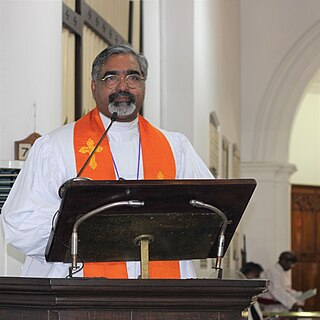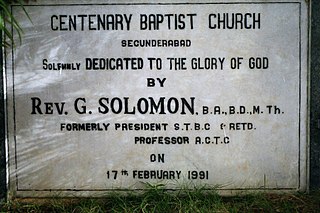
Victor Premasagar (1927–2005) was the fourth successor of Frank Whittaker as Bishop in Medak. He was an Indian churchman and Old Testament scholar who made major contributions to research on the Old Testament and to the field of theology. Premasagar's articles appeared in the Expository Times (1966), the Vetus Testamentum (1966), the International Review of Mission (1972), and the Indian Journal of Theology (1974) and cited in major works relating to the theme of Promise in the Bible and critical works on Psalms LXXX and the Hebrew word HOQ in the Tanakh.

Andhra Christian Theological College (ACTC) is a seminary in Telangana which was founded in 1964. It is affiliated with India's first university, the Senate of Serampore College (University), and has degree-granting authority under a Danish charter ratified by the government of West Bengal. ACTC is on the Hussain Sagar canal (north) in Gandhinagar, Hyderabad, about 4 kilometres (2.5 mi) from the Secunderabad Junction railway station.

B. P. Sugandhar was the fifth successor of Frank Whittaker as Bishop - in - Medak of the Church of South India whose bishopric lasted for more than a decade and half from 1993 through 2009 coinciding with the archbishoprics of Samineni Arulappa and Marampudi Joji of the Archdiocese of Hyderabad.
Govada Dyvasirvadam is Bishop Emeritus of Krishna-Godavari Diocese of the Church of South India.

Bishop Emeritus P. Surya Prakash was the fifth Bishop-in-Karimnagar Diocese of the Church of South India. from 2007 through 2014 and occupied the Cathedra in Karimnagar's Wesley Cathedral. He retired on account of superannuation in 2014 following which the Church of South India Synod headquartered in Chennai appointed a successor to him in 2015.
Henry Diwakar Luther Abraham was the second successor of Frank Whittaker as Bishop in Medak and an able administrator.
Eber Priestley was the first successor of Frank Whittaker as Bishop in Medak.
Frank Whittaker was the first Bishop - in - Medak in the Church of South India, with his see in Medak in the Indian state of Hyderabad. Originally a Methodist, he became a bishop when several denominations in India merged to form the Church of South India on 27 September 1947.
Bishop T. B. D. Prakasa Rao was the fourth CSI-Bishop - in - Krishna-Godavari of the Protestant Church of South India who occupied the Cathedra placed at CSI-St. Paul's Cathedral, Vijayawada. The Bishopric of Prakasa Rao lasted for two decades from 1981 through 2001, one of the longest in the history of the Church of South India Society. Prakasa Rao led the bishopric of Krishna-Godavari that comprised the Christian missions established by the London Missionary Society (LMS) and the Church Missionary Society (CMS) which merged its South India Christian missions in India into the Church of South India Society which was inaugurated in 1947 at the CSI-St. George's Cathedral, Madras.
Ryder Devapriam was systematic theologian who taught during the 1960s and the 1970s at the Andhra Christian Theological College, a Protestant Regional Theologiate in Secunderabad, affiliated to the nation's first University, the Senate of Serampore College (University) {a University under Section 2 (f) of the University Grants Commission Act, 1956}with degree-granting authority validated by a Danish Charter and ratified by the Government of West Bengal.
G. T. Abraham was Bishop - in - Diocese of Nandyal of the Church of South India. He also taught Christian Ministry at the Andhra Christian Theological College. Hyderabad
Telugu Christians or Telugu Kraistava are a religious community who form the third-largest religious minority in the Indian states of Andhra Pradesh and Telangana. According to the 2001 Census of India, there are over a million Christians in Andhra Pradesh, constituting around 1.51% of the state's population. This is a decrease from the 1971 census figure which put the percentage of Christians in state as 2%, and this decrease is mainly a result of low birth rates and emigration. However census figures for Christians in Telugu states have long been an underestimate as most Christians record their religion as 'Hindu' on the census.

Ravela Joseph was a Sapphire jubilee-Priest involved in Spiritual formation from the mid-1960s into the early 2000s in the Telugu states. He taught Systematic theology in Major Seminaries affiliated to the Senate of Serampore College (University), the nation's first modern University {a University under Section 2 (f) of the University Grants Commission Act, 1956} with degree-granting authority validated by a Danish Charter and ratified by the Government of West Bengal.
Bishop G. B. Devasahayam(born 23 August 1925; died 20 August 1996) was the second elected CSI-Bishop - in - Karimnagar Diocese of the Church of South India who occupied the Cathedra from 1982 through 1987 placed in the CSI-Wesley Cathedral in Karimnagar Town in Telangana, India
Bishop Babbili Prabhudass(died 1996) was the first elected Bishop - in - Karimnagar Diocese of the Church of South India which was ecclesiastically bifurcated from the Diocese of Dornakal of the Church of South India in early 1978. Prabhudass led the bishopric for a period of five years from 1978 through 1982.

A. C. Solomon Raj is the seventh successor of Frank Whittaker and eighth Bishop in Medak of the Protestant Church of South India Society and shepherds the Diocese from the Cathedra of the Bishop housed in the CSI-Medak Cathedral in Medak Town, Telangana, India. On 12 October 2016, the Church of South India Synod headquartered in Chennai, appointed Solomon Raj to assume the ecclesiastical Office of the Bishopric of Medak and was consecrated the next day on 13 October 2016 at the CSI-St. George's Cathedral, Chennai, ending four years of sede vacante in the Diocese of Medak which was without a bishop during the intervening period of 2012–2016.
CSI-Garrison Wesley Church located in Trimulgherry is among the oldest churches in Secunderabad under the auspices of the Protestant Church of South India (CSI) within the ecclesiastical jurisdiction of the Diocese of Medak. Situated in Lal Bazar civilian area of the Secunderabad Cantonment, the CSI-Garrison Wesley Church is in near vicinity of the Military College of Electronics and Mechanical Engineering (MCEME), and the church has continued to attract not only its regular worshipers but also the new visitors from the nearby military stations of the Indian Army and the Indian Air Force through its regular Sunday Mass as well as its annual Good Friday, Easter and Christmas programmes.

G. Solomon was an Old Testament Scholar and a Baptist Patriarch hailing from the Protestant Samavesam of Telugu Baptist Churches Society (an affiliate member of the Baptist World Alliance and the National Council of Churches in India) and led it as its President during the years 1978-1982 overseeing the spiritual affairs of the Church Society whose ecclesiastical jurisdiction comprises the three states of Tamil Nadu, Andhra Pradesh and Telangana with 873 Churches comprising nearly a million members per present statistics.
Regunta Yesurathnam was a priest hailing from the Diocese of Medak of the Church of South India, headquartered in Medak, notable as a systematic theologian who served as a faculty member from 1974 through 2001 of the Andhra Christian Theological College, affiliated to the Senate of Serampore College (University), in Secunderabad, Telangana, India,.
Bishop Bunyan Joseph was the first and only elected Bishop - in - Anantapur-Kurnool Diocese who was consecrated on 27 September 1947 and was among the 15 inaugural Bishops when the Church of South India was inaugurated at the CSI-St. George's Cathedral, Chennai. He was presented for consecration by The Venerable F. F. Gladstone and Canon T. Sithers. to the Presiding Bishop Cherakarottu Korula Jacob, who as the first Moderator, consecrated Bunyan Joseph.









